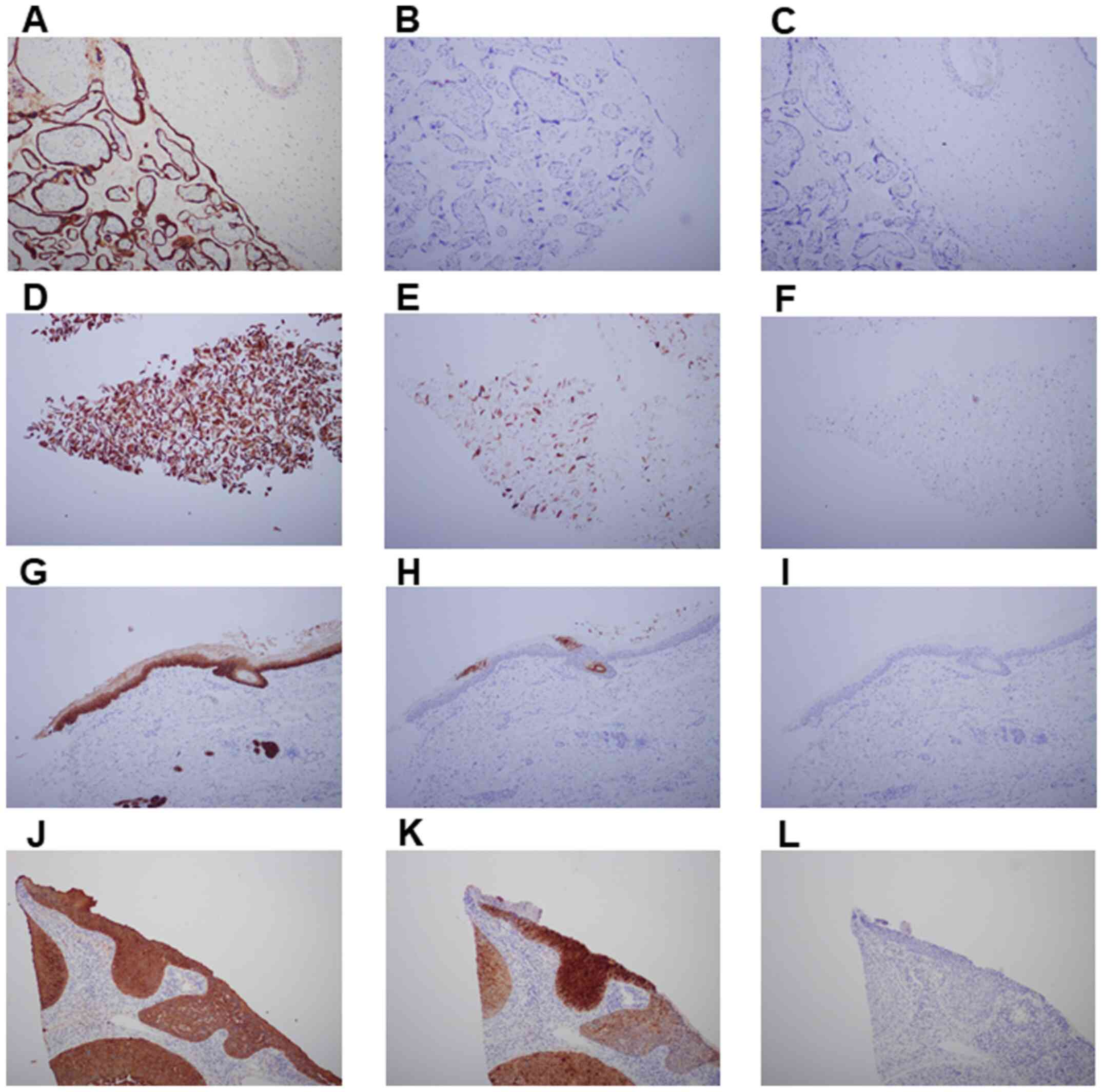|
1
|
Conde-Agudelo A and Romero R: Amniotic
fluid embolism: An evidence-based review. Am J Obstet Gynecol.
201:445.e1–445.e13. 2009.PubMed/NCBI View Article : Google Scholar
|
|
2
|
Kobayashi H: Amniotic fluid embolism:
Anaphylactic reactions with idiosyncratic adverse response. Obstet
Gynecol Surv. 70:511–517. 2015.PubMed/NCBI View Article : Google Scholar
|
|
3
|
Schneider SS, Schick C, Fish KE, Miller E,
Pena JC, Treter SD, Hui SM and Silverman GA: A serine proteinase
inhibitor locus at 18q21.3 contains a tandem duplication of the
human squamous cell carcinoma antigen gene. Proc Natl Acad Sci USA.
92:3147–3151. 1995.PubMed/NCBI View Article : Google Scholar
|
|
4
|
Kanayama N, Yamazaki T, Naruse H, Sumimoto
K, Horiuchi K and Terao T: Determining zinc coproporphyrin in
maternal plasma - a new method for diagnosing amniotic fluid
embolism. Clin Chem. 38:526–529. 1992.PubMed/NCBI
|
|
5
|
Kobayashi H, Ohi H and Terao T: A simple,
noninvasive, sensitive method for diagnosis of amniotic fluid
embolism by monoclonal antibody TKH-2 that recognizes NeuAc alpha
2-6GalNAc. Am J Obstet Gynecol. 168:848–853. 1993.PubMed/NCBI View Article : Google Scholar
|
|
6
|
Kobayashi H, Ooi H, Hayakawa H, Arai T,
Matsuda Y, Gotoh K and Tarao T: Histological diagnosis of amniotic
fluid embolism by monoclonal antibody TKH-2 that recognizes NeuAc
alpha 2-6GalNAc epitope. Hum Pathol. 28:428–433. 1997.PubMed/NCBI View Article : Google Scholar
|
|
7
|
Oi H, Kobayashi H, Hirashima Y, Yamazaki
T, Kobayashi T and Terao T: Serological and immunohistochemical
diagnosis of amniotic fluid embolism. Semin Thromb Hemost.
24:479–484. 1998.PubMed/NCBI View Article : Google Scholar
|
|
8
|
Oi H, Naruse K, Noguchi T, Sado T, Kimura
S, Kanayama N, Terao T and Kobayashi H: Fatal factors of clinical
manifestations and laboratory testing in patients with amniotic
fluid embolism. Gynecol Obstet Invest. 70:138–144. 2010.PubMed/NCBI View Article : Google Scholar
|
|
9
|
Tsunemi T, Oi H, Sado T, Naruse K, Noguch
T and Kobayashi H: An overview of amniotic fluid embolism: Past,
present and future directions. Open Womens Health J. 6:24–29.
2012.
|
|
10
|
Naruse K, Noguchi T, Yoshida S, Tsunemi T,
Shigetomi H, Oi H and Kobayashi H: Identification of interleukin-6
(IL-6) and squamous cell carcinoma (SCC) as amniotic fluid-specific
markers. Open J Obstet Gynecol. 2:147–150. 2012.
|
|
11
|
Iwai K, Oi H, Tsunemi T, Naruse K, Noguchi
T, Sado T and Kobayashi H: Sialyl Tn and Zinc coproporphyrin 1 as
potential serum markers of amniotic fluid embolism. Adv Obstet
Gynecol. 63:483–487. 2011.(In Japanese).
|
|
12
|
Legrand M, Rossignol M, Dreux S, Luton D,
Ventré C, Barranger E, Laribi S, Payen D and Muller F: Diagnostic
accuracy of insulin-like growth factor binding protein-1 for
amniotic fluid embolism. Crit Care Med. 40:2059–2063.
2012.PubMed/NCBI View Article : Google Scholar
|
|
13
|
Koike N, Oi H, Naruse K, Kanayama N and
Kobayashi H: Squamous cell carcinoma antigen as a novel candidate
marker for amniotic fluid embolism. J Obstet Gynaecol Res.
43:1815–1820. 2017.PubMed/NCBI View Article : Google Scholar
|
|
14
|
Kato H: Expression and function of
squamous cell carcinoma antigen. Anticancer Res. 16:2149–2153.
1996.PubMed/NCBI
|
|
15
|
Ullman E, Pan JA and Zong WX: Squamous
cell carcinoma antigen 1 promotes caspase-8-mediated apoptosis in
response to endoplasmic reticulum stress while inhibiting necrosis
induced by lysosomal injury. Mol Cell Biol. 31:2902–2919.
2011.PubMed/NCBI View Article : Google Scholar
|
|
16
|
Benson MD, Cheema N, Kaufman MW,
Goldschmidt RA and Beaumont JL: Uterine intravascular fetal
material and coagulopathy at peripartum hysterectomy. Gynecol
Obstet Invest. 73:158–161. 2012.PubMed/NCBI View Article : Google Scholar
|
|
17
|
Karakas B, Qubbaj W, Al-Hassan S and
Coskun S: Noninvasive digital detection of fetal DNA in plasma of
4-week-pregnant women following in vitro fertilization and embryo
transfer. PLoS One. 10(e0126501)2015.PubMed/NCBI View Article : Google Scholar
|
|
18
|
Kase S, Namba K, Iwata D, Mizuuchi K,
Kitaichi N, Tagawa Y, Okada-Kanno H, Matsuno Y and Ishida S:
Diagnostic efficacy of cell block method for vitreoretinal
lymphoma. Diagn Pathol. 11(29)2016.PubMed/NCBI View Article : Google Scholar
|
|
19
|
Cataltepe S, Gornstein ER, Schick C,
Kamachi Y, Chatson K, Fries J, Silverman GA and Upton MP:
Co-expression of the squamous cell carcinoma antigens 1 and 2 in
normal adult human tissues and squamous cell carcinomas. J
Histochem Cytochem. 48:113–122. 2000.PubMed/NCBI View Article : Google Scholar
|
|
20
|
Izuhara K, Yamaguchi Y, Ohta S, Nunomura
S, Nanri Y, Azuma Y, Nomura N, Noguchi Y and Aihara M: Squamous
cell carcinoma antigen 2 (SCCA2, SERPINB4): An emerging biomarker
for skin inflammatory diseases. Int J Mol Sci.
19(1102)2018.PubMed/NCBI View Article : Google Scholar
|
|
21
|
Yoshimasu T, Maebeya S, Suzuma T, Bessho
T, Tanino H, Arimoto J, Sakurai T and Naito Y: Disappearance curves
for tumor markers after resection of intrathoracic malignancies.
Int J Biol Markers. 14:99–105. 1999.PubMed/NCBI
|
|
22
|
Okawa T, Yamaguchi Y, Kou K, Ono J, Azuma
Y, Komitsu N, Inoue Y, Kohno M, Matsukura S, Kambara T, et al:
Serum levels of squamous cell carcinoma antigens 1 and 2 reflect
disease severity and clinical type of atopic dermatitis in adult
patients. Allergol Int. 67:124–130. 2018.PubMed/NCBI View Article : Google Scholar
|
|
23
|
Kobayashi H: The entry of fetal and
amniotic fluid components into the uterine vessel circulation leads
to sterile inflammatory processes during parturition. Front
Immunol. 3(321)2012.PubMed/NCBI View Article : Google Scholar
|















